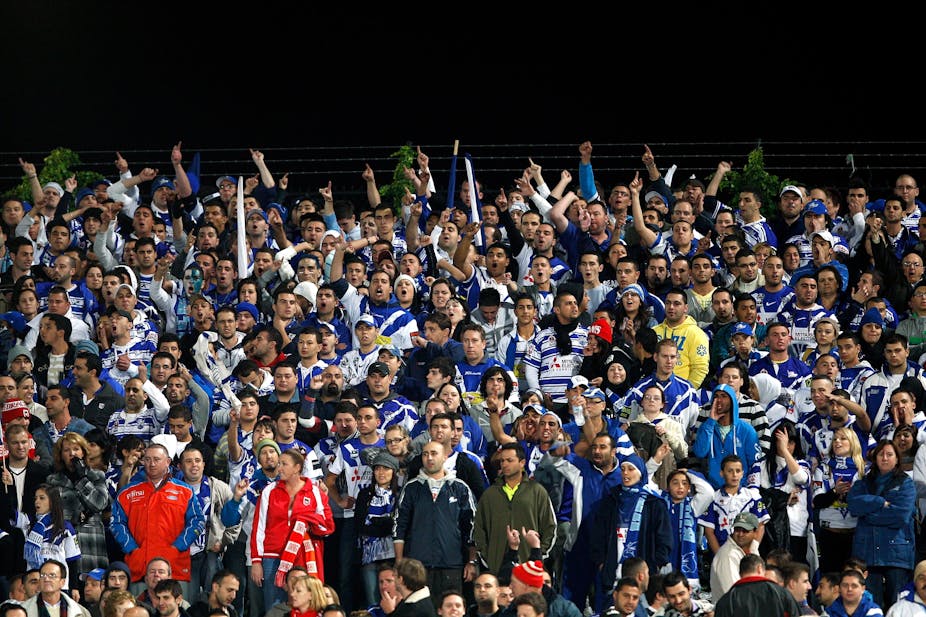The Australian Crime Commission’s report on organised crime and drugs in sport has unleashed a storm amongst sports fans, particularly those who follow the clubs or codes so far implicated. Use of new performing and image enhancing drugs (PEIDs) is now thought to be widespread, with clear links to organised criminal activity including match fixing.
The main focus of all this concern has so far been on the integrity of sport: that is, concern that sports will be corrupted, either by drug cheating, or by otherwise compromising athletes or administrators or both in order to defraud bookmakers. The scramble to understand and come to terms with the depth of the PEID problem suggests sports bodies have less than perfect knowledge about what’s really going on.
In Australia, where sport is widely, fervently and passionately embraced, damage to the integrity of sport also damages public confidence and undermines supporter enjoyment. It poses significant financial risks, to the viability of sports identified as at risk from doping or match-fixing, to the continued participation of sportspeople caught doping or acting corruptly, and (as the ACC notes) to the integrity of sports betting operations.
The last of these has been a focus for much integrity-related activity in major professional codes in Australia in recent years, as the amount gambled on professional sport has increased. The sports betting market (as distinct from the more established horse racing gambling market) has grown rapidly since the mid-2000s and is now estimated at around $300 million to $400 million per year. This is a lot of money, but it’s still a modest proportion of Australia’s $20 billion gambling market. Nonetheless, it’s a high profile business: sporting clubs have been quick to take up sponsorship and advertising deals with bookmakers, and commercial media is saturated with gambling advertising.
So far, codes like the NRL, AFL and cricket have argued that being in partnership with (that is, getting a cut from) betting agencies is the best way to keep up with integrity issues. Being in close company with bookies, we’re told, allows data on betting to be shared and for suspicious transactions to be carefully analysed, identifying those who benefit from unusual or suspicious activity.
The clubs say that this has flushed out inappropriate activity, although most of those caught this way have so far been small fish. However, the data could just as easily be obtained by regulation. Codes don’t need to be in bed with bookies. In fact, deriving financial returns from the proceeds of gambling may blind administrators to the dangers gambling poses for their sport.
But more broadly, and I think more significantly, the integrity of sport is also damaged by the harm that unrestrained promotion of gambling is likely to do to supporters of the game. Advertising and sponsorship are not altruistic activities. Bookies advertise and sponsor teams for a number of reasons: obviously to encourage people to gamble, but – just as the ACC report notes in relation to criminals, and as we know from tobacco and alcohol sponsorship deals - bookies also want to legitimate themselves and their product through association with famous and well-regarded teams and individuals.
The effects of the explosion in sports betting, and on its aggressive promotion, are largely unknown, particularly on those young fans who have grown up with the odds plastered everywhere. However, we do know that exposure to gambling opportunities is a key risk factor for the development of gambling problems (which is why the pokies, ubiquitous as they are in Australia, are the current source of 75% or more of Australia’s gambling problems). We can expect to find more and more problem gamblers amongst sports gamblers in coming years, as the new generation deals with the convergence of mobile and other interactive gambling technologies, the ubiquitous promotion of gambling, and clubs and codes happily allowing their brand to be a billboard for one or other of the many online bookies.
There have been calls to ban sportsbetting until we better understand the problems it causes. Making it illegal won’t stop it (especially that aspect of it occurring offshore) but it would remove any doubts as to the wisdom of sportspeople being connected with bookies. Perhaps more practical would be to prohibit the advertising and promotion of gambling via sport. As Andrew Whitehouse points out, kids now see gambling as integral to sport. One way to defuse the ticking time bomb is to alter that by delinking sport from gambling.
It would also demonstrate that clubs had the integrity to care more about their supporter base than the dollars they make by taking a cut from the bookies. Any sport that steps away from the pursuit of gambling revenue and helps to stop its supporters being subject to constant bombardment from bookmakers will go a long way towards demonstrating real integrity, and genuine respect for its supporters.

